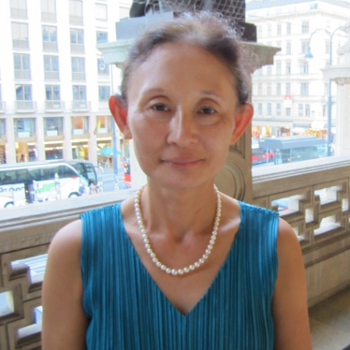The Met’s production of Simon Boccanegra, created by Giancarlo del Monaco 1995, is a traditional one that faithfully and elaborately recreated 14th-century Genoa with all its splendor and glory. The prologue cleverly showed both the church and the palace of the Patrician Fiesco at the rear, at an angle, with a large statue in the middle of the square. Act I opened to show a palace garden by the sea, bathed in warm sunlight under blue sky. The Doge’s palace and its Council Chamber boasted magnificent architectural and artistic details. There was no updating of the settings or the costume. As one patron was overheard as she was leaving, “Just like the old times”.
So the success or failure of the evening almost completely depended upon musical factors. While initially there were some awkward and uncoordinated moments, overall the first evening of this revival was a delightful combination of opera's old guards holding their own while allowing the young to join in their celebration of the art form as living theater. During an extended curtain call that lasted five minutes, the singers seemed genuinely pleased to be in one another’s company, and they all paid warm and affectionate tributes to maestro James Levine in the pit.
In the title role, Plácido Domingo sang with great artistic integrity, singing a baritone role. At 75 years of age, his voice had a beauty and thrust that did not diminish throughout the evening. His presence was palpable in each scene. While there was an occasional hesitation and tentativeness, Mr Domingo’s overall performance was that of a consummate artist who continues to explore artistic possibilities. He excelled in emotional moments, singing softly. The duet with his long-lost daughter Maria (known as Amelia) in Act I scene i was emotionally potent, and Simon’s heartfelt utterance “figlia” at the end was delivered with heartbreaking tenderness. His prolonged death scene in Act III was a tour de force in vocal acting.
Another old guard, reprising the role of Fiesco, a Patrician and Maria’s grandfather, was Ferruccio Furlanetto. Fiesco’s challenging aria “Il lacerato spirito” opened the opera, and here, Mr Furlanetto did not sound fully warmed up, with some unsteadiness in his voice. However, his later scenes showed off his deep, penetrating bass in good form, and he was particularly impressive in his strong low notes. A native Italian, he infused genuine emotion and meaning to the text.
Tenor Joseph Calleja was a standout as Gabriele Adorno, the young rebel in love with Maria. His voice is truly unique, going back to the old Italian singing tradition. His voice had the usual unmistakable, diffused timbre, yet a floating ease that was breathtakingly beautiful. In ensembles, he repeatedly hit high notes effortlessly, his voice riding above the orchestra. His phrasing was impeccable, with genuine legato.
Another pleasure of the evening was Lianna Haroutounian’s Met role debut as Amelia. She began her Act I aria with some pitch problems, but she soon regained footing and went from strength to strength. Her voice had youthful beauty appropriate to the role and her high notes were delivered cleanly and thrillingly. She excelled in duet with Mr Calleja and then with Mr Domingo later in the scene, her rich soprano complemented the male voices.
Brian Mulligan brought his virile baritone and strong acting skills to the villain Paolo, who was defeated in his ambition and yet succeeded in assassinating Simon by poisoning his water. Richard Bernstein, as Pietro, another villain, and Noah Baetge as a captain made worthy contributions.
As with many Verdi operas, some of the musical highlights of Boccanegra are ensemble scenes, most notably the great Council Chamber scene. Verdi experimented with harmonies and instrumentation, and the Met Orchestra played with both delicate beauty and dynamic urgency. The Met Chorus performed with their usual discipline in the numerous crowd scenes, and their quiet whispers to end Act I were spine-chilling. In Simon Boccanegra, Verdi truly succeeded in combining historical and political drama with intimate human tragedy, as Simon’s death was quietly mourned with slowly fading music that left the audience momentarily silent.




